NEW YORK: The escalation in the conflict between Israel and Hezbollah is of “grave concern” for the World Health Organization, and the agency is exerting substantial efforts in ensuring that countries in the region are “ready for the worst-case scenario when it comes to health preparation,” WHO’s regional chief has told Arab News.
Dr. Hanan Balkhy, a Saudi physician who was appointed to the role of director for the Eastern Mediterranean in January this year following a distinguished career in medicine, made the comment while she was in New York City last week to rally support for critical public health initiatives.
“When it comes to the health preparation, we were able over the past months to pre-place emergency kits within Lebanon and with a few other neighboring countries to at least sustain some of the commodities that would be needed in case the escalation reached a very high point,” she told Arab News.
“We work very closely with the ministers of health, within the ministries themselves, and we make sure that we can train people on certain skills that we know will be necessary.”
The agency has conducted “hundreds” of training sessions — including mass casualty training, health workforce training and EMT training — within Lebanon and other WHO member states in the region.
Some of those countries have already faced significant pressure on their healthcare systems as a result of Israel’s war in Gaza, Balkhy said.
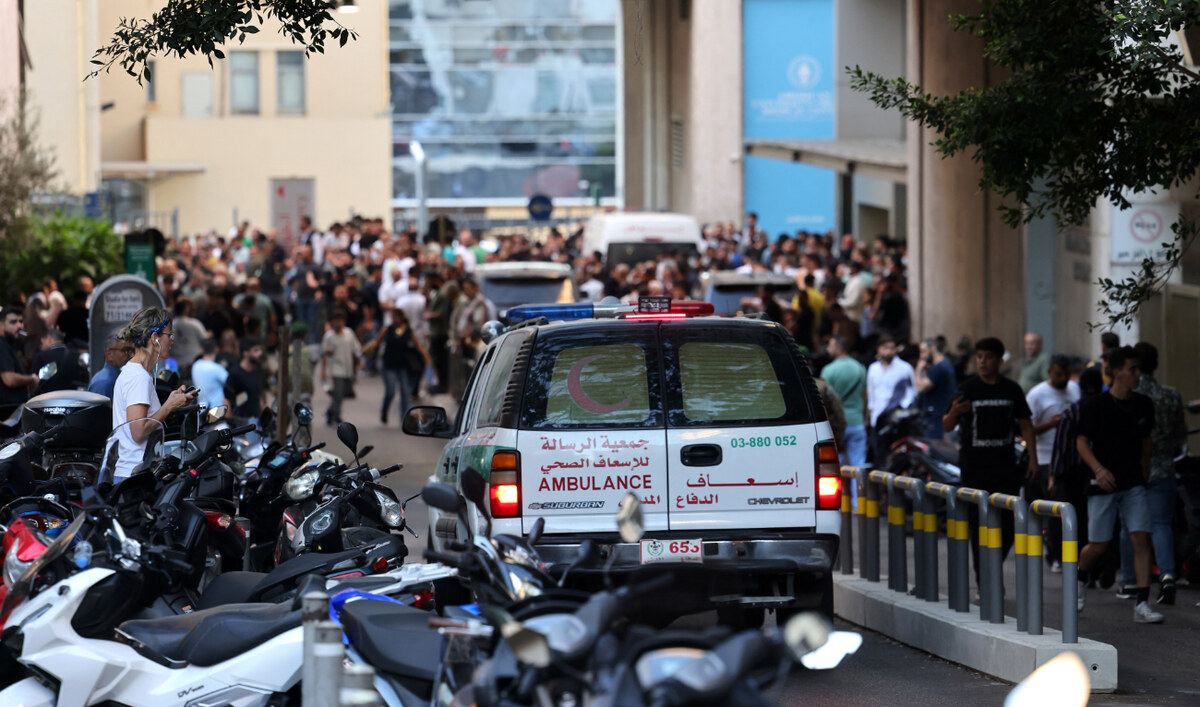
An ambulance rushes wounded people to the American University of Beirut Medical Center, on September 17, 2024, after explosions hit locations in several Hezbollah strongholds around Lebanon. (AFP)
“There’s big pressure on the member states that are surrounding the Occupied Palestinian Territories, from receiving the (Palestinian) patients and taking care of them, but now there’s actual escalation of war in southern Lebanon.
“So, with that in mind, we’re trying to put together at least the basics that are needed for the worst-case scenario.”
Balkhy voiced concern over the recent pager and walkie-talkie explosions across Lebanon.
On 17 and 18 September 2024, thousands of handheld pagers and hundreds of walkie-talkies intended for use by Hezbollah operatives exploded simultaneously across Lebanon and Syria in an Israeli attack, killing dozens, including two children, and injuring thousands more.
Most of the dead are believed to have been fighters, based on death notices posted online by Hezbollah, the Iran-backed Shiite militia.
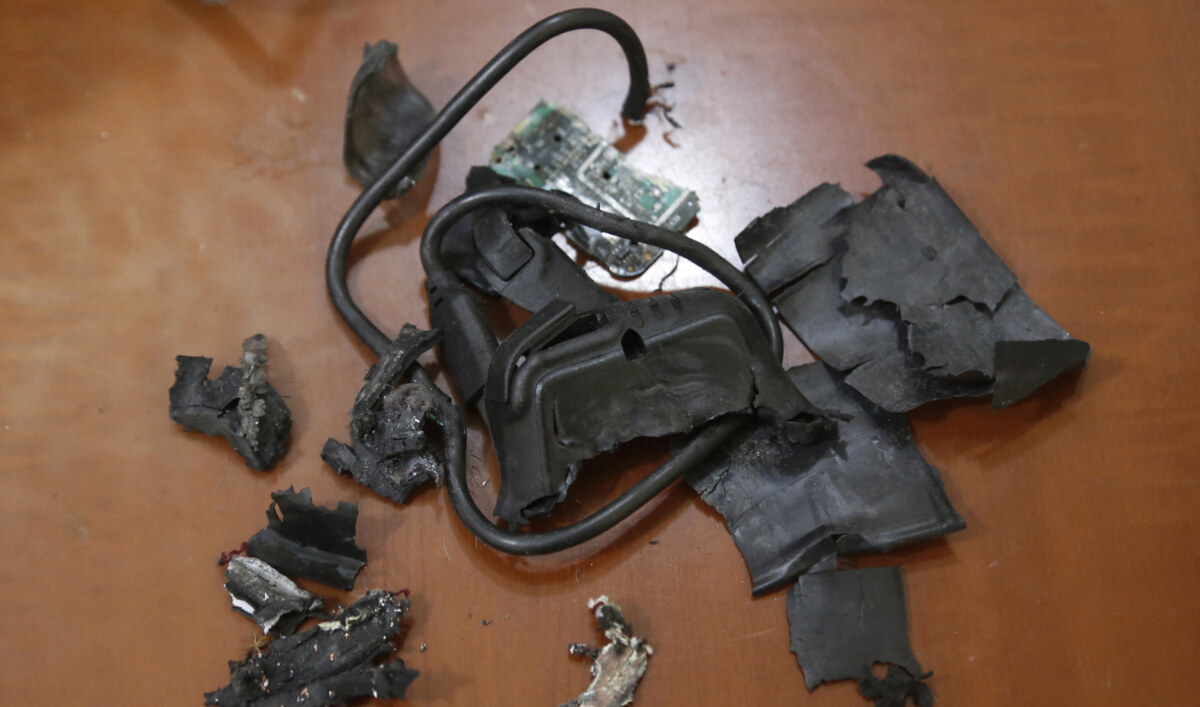
A photo taken on September 18, 2024, in Beirut’s southern suburbs shows the remains of exploded pagers on display. (AFP)
UN High Commissioner for Human Rights Volker Turk has called for an “independent, thorough and transparent investigation” into the mass explosion, adding that “simultaneous targeting of thousands of individuals, whether civilians or members of armed groups, without knowledge as to who was in possession of the targeted devices, their location and their surroundings at the time of the attack, violates international human rights law and, to the extent applicable, international humanitarian law.”
The device explosions led to “very complex injuries in the face and in the hands,” said Balkhy.
Doctors in Lebanon say they had never seen the kind of maiming that resulted from the pager attacks. Described some of the wounds as “horrific,” they said the injuries have ranged from puncture wounds in the face, amputated hands, ruptured eyeballs, abdominal wounds, ruptured bones, and broken jaws.
“We’re looking and seeking to find experts that can help us in identifying the best methods of treatment and how we can support the Lebanese Ministry of Health,” Balkhy said, pointing to “empathy” between member states and “a strong sense of solidarity.”

People gather outside a hospital in the city of Baalbeck in eastern Lebanon on September 17, 2024, after explosions hit locations in several Hezbollah strongholds around the country. (AFP)
Balkhy also oversees WHO operations in Gaza, where the healthcare system is “on its knees” according to the UN.
“None of the healthcare facilities are fully functioning,” said Balkhy who witnessed the stark reality of the situation during a visit to Gaza and the West Bank in July.
Over 500 healthcare workers have been killed by Israeli airstrikes since the beginning of the war in October last year, and where out of 36 hospitals, 17 remain only partially functional. Primary healthcare and community-level services are frequently suspended in the battered enclave, due to insecurity, attacks and repeated evacuation orders.
More than 22,500 Palestinians have suffered life-changing injuries since Israel launched its military campaign in retaliation for a Hamas-led attack on southern Israel on Oct. 7 during which militants gunned down civilians and snatched people in towns, along highways and at a techno music festival.
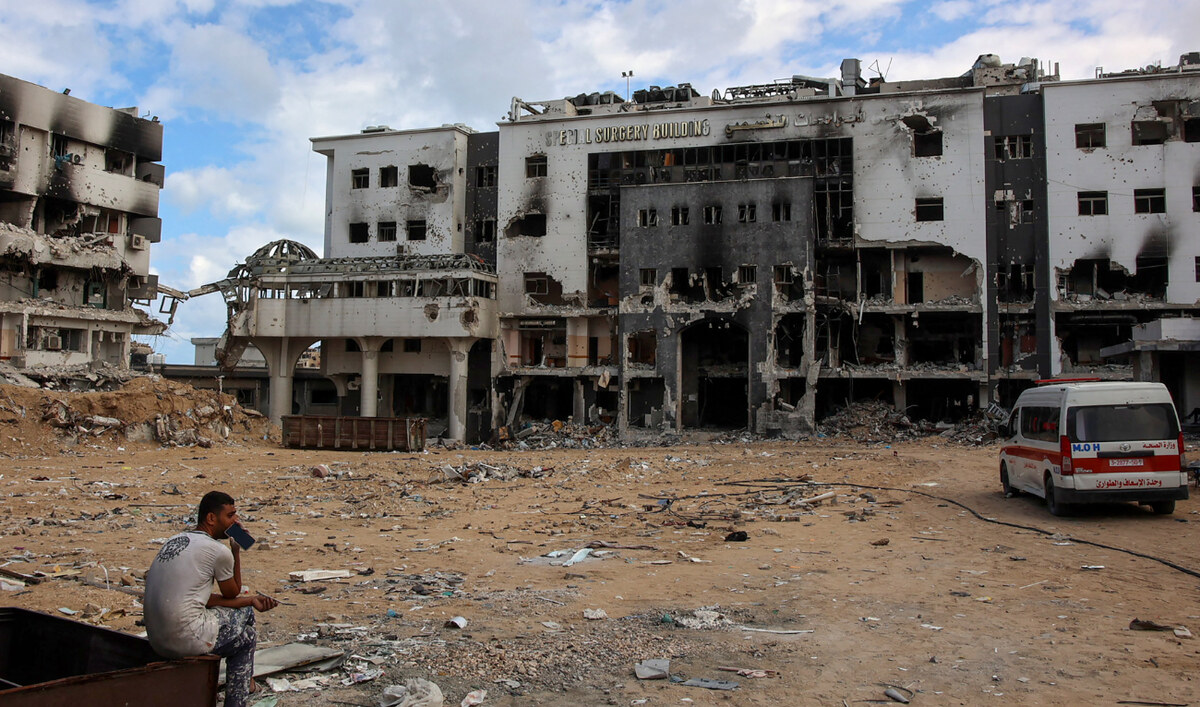
A man sits near the destroyed Al-Shifa hospital in Gaza City on September 17, 2024. (AFP)
Medical staff operating in Gaza are under “significant amounts of pressure and stress,” Balkhy said, with surgeons forced to operate in increasingly makeshift facilities, often without access to basic medical equipment.
“The healthcare facilities are not just buildings. They are buildings, they are medication and instruments, and commodities, they are also the health workforce.
“There’s not one single individual (in Gaza) who has not been faced (with) being asked to move from one point to another.
“Many of them have moved many, many times, but also with the deaths and the losses within their family.”
Yet healthcare workers “continue to stand on their feet and provide care when appropriate,” Balkhy added.
IN NUMBERS
- 1.9m Palestinians who have fled their homes since Oct. 7, 2023.
- 41,150+ People killed in Gaza in fighting and Israeli bombardment.
- 1,200 People killed in Israel during Oct. 7 Hamas-led attack.
However, the type of traumas and injuries inflicted on Palestinians have been “unprecedented” and “devastating,” requiring “very complex healthcare systems” of the type that Gaza lacks, she said.
“Those who have been working in the humanitarian field for over a decade have acknowledged that the types of compound fractures, soft tissue injuries, skull injuries … need neurosurgeons.
“You need very sophisticated orthopedic surgeons. You need very sophisticated equipment.”
In response, the WHO has worked in tandem with member states to organize medical evacuations across the Middle East and beyond.
Since October 2023, over 5,000 patients have been evacuated for treatment outside Gaza, with over 80 percent receiving care in Egypt, Qatar and the UAE, and a further 10,000 patients are currently in need of medical evacuation for specialized care.
This includes newborn babies requiring intensive care whose families are trying to evacuate them following the bombing of specialist maternity units across Gaza.
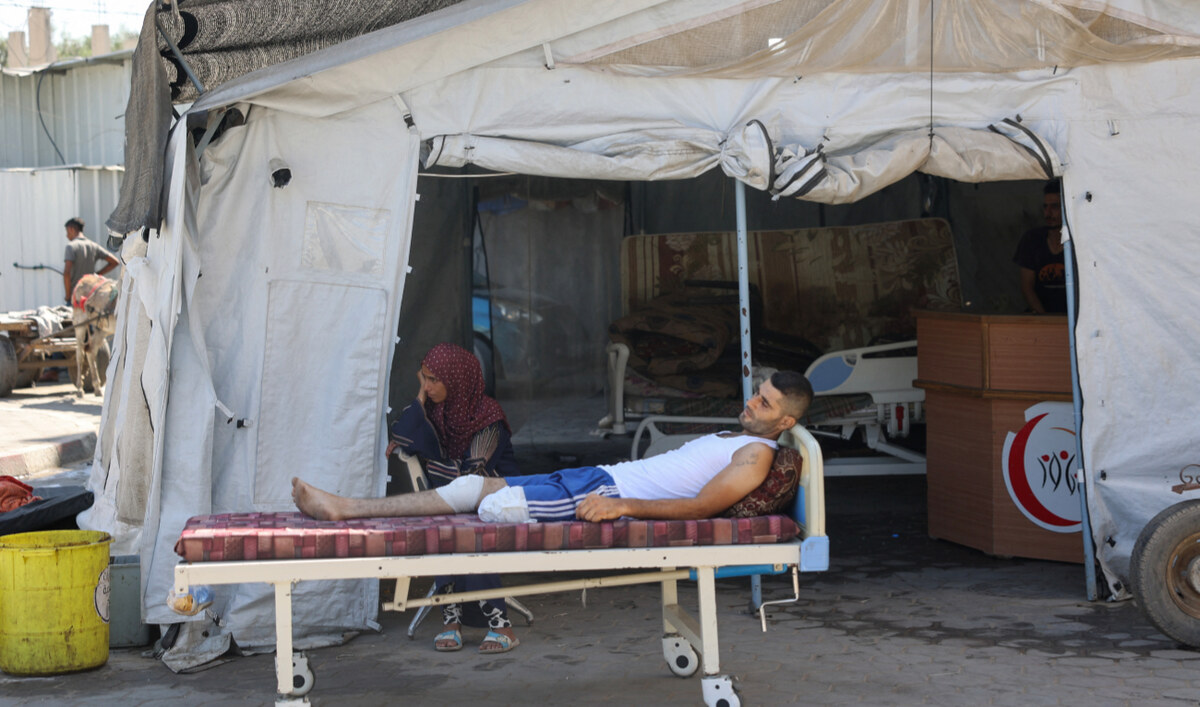
An injured Palestinian man is set for evacuation from the Al-Aqsa Martyrs Hospital in Deir Al-Balah in the central Gaza Strip following renewed Israeli evacuation orders for the area on August 26, 2024. (AFP)
Another major concern of health officials has been the growing lack of clean water and sanitary conditions in Gaza.
Hundreds of the enclave’s water filtration and sanitation facilities were destroyed by Israeli airstrikes since the beginning of the war.
Balkhy said that the lack of clean water makes it “very difficult” to provide the basics of healthcare.
She also highlighted the worrying proliferation of mental trauma among the population in Gaza.
“The last thing that worries me and that I saw of significance was what we will be facing from the mental stress disorders among the people who remain there and that will continue to work there.
“We will need, as the WHO, with partners, to help support, rehabilitate and address some of these issues.
“So, there’s a lot. The environment, which is a crucial part of the health and wellbeing of individuals, is extremely disturbing.

A boy walks through a puddle of sewage water past mounds of trash and rubble along a street in the Jabalia camp for Palestinian refugees in the northern Gaza Strip on August 14, 2024. (AFP)
Balkhy described scenes of sewage “running in the streets” as well as endless rubble, adding: “It’s extremely devastating to be there on the ground.”
A significant breakthrough in the WHO’s Gaza campaign came earlier this month with the completion of the first round of a polio vaccination campaign.
A month earlier, a 10-year-old baby had been left partly paralyzed by the disease, in what was the enclave’s first reported case in 25 years.
The WHO’s campaign in central Gaza involved more than 2,000 health workers operating across 143 sites.
“We’re very happy that we were able to secure these days of tranquillity to ensure that we conducted the first round of the polio campaign,” said Balkhy.
“The whole world has their eyes on this polio campaign because the success is not just a success for the Occupied Palestinian Territories and Gazans, it’s a success for the world, because pathogens know no borders, and there’s a risk that polio might again spread.”
“So, I’m very happy that that has happened.”

A child receives a vaccination for polio at a makeshift camp for people displaced by conflict in a school run by the UNRWA in Khan Yunis in the southern Gaza Strip on September 5, 2024. (AFP)
A second round of vaccination is still needed, however, to ensure optimal levels of immunization, Balkhy added.
“Every child needs to receive those two doses, between one to two months apart,” she said.
A second round is set for mid-October, and the WHO will look to “replicate what we did in the first round.
“The WHO, UNICEF, UNRWA and the Ministry of Health of the Palestinian Authority did amazing work to make this happen together,” Balkhy said.
“But also significant credit goes to the workers on the ground.
“All those lessons learned from the first round of the polio campaign will be very much looked at in order to have a more successful and efficient second round for the polio.”
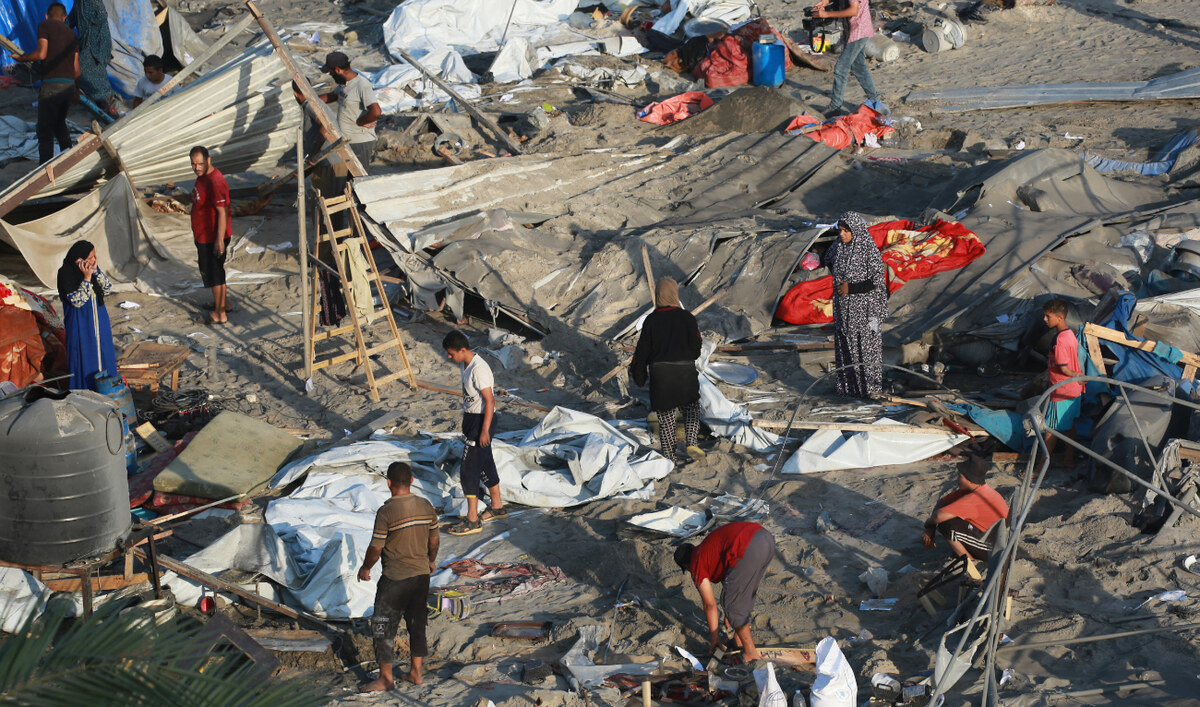
Palestinians inspect the damage at the site of Israeli strikes on a makeshift displacement camp in Khan Yunis in the Gaza Strip on September 10, 2024. (AFP)
However, Balkhy gave warning that health authorities are only at the beginning of the campaign to rehabilitate living conditions in Gaza.
“As an infectious disease person, as an epidemiologist and as a pediatrician, we have a long way to go to rehabilitate the environment for the people in Gaza to to be living with dignity and with appropriate methods to have proper hygiene, instruments, clean water, soap and so on,” she said.
Balkhy is also focused on Sudan, where millions of people have been displaced by the country’s raging civil war, and famine has been declared in the North Darfur region.
Her latest visit to the country came two weeks ago, when she called for warring factions to abide by international law and end their attacks on healthcare facilities and workers.
The WHO reported in July that since the outbreak of the war in April 2023, more than 88 attacks in Sudan had targeted health facilities, ambulances, patients and workers.

People inspect a destroyed medical storage in Nyala, the capital of South Darfur province, on May 2, 2023. (AFP)
“It’s very important to sustain the regular people, the civilians who are not engaged in any of these wars, to be able to feel secure and that the humanitarians and the health workers can do their job,” Balkhy said.
“We have been able to work with the Ministry of Health of Sudan to come up with very good plans on rehabilitating primary health care and some of the secondary and tertiary healthcare facilities.”
Balkhy also visited a site for internally displaced people, warning that the level of access to clean water and sanitation, as well as the risk of cholera, are “huge challenges.”
She added: “It came also during the rainy season. It was expected — none of this is a surprise. We’ve been talking about this for quite a while.
“We’ve been able to, of course, with the Ministry of Health, establish cholera treatment centers and rehydration centers.
“So, the immunization program is is moving forward. We’re trying our best — it’s not optimal. But we do hope that we will be able to access as many children as possible.”

Cholera patients are treated at a clinic in Sudan’s Red Sea State on September 25, 2024. (AFP)
At the General Assembly in New York City, Balkhy eyed a breakthrough resolution in a high-level meeting on antimicrobial resistance.
“It’s the silent pandemic. I have led the Directorate of Antimicrobial Resistance as the first assistant director general in Geneva for close to five years,” she said.
“The fruition of reaching to this point of a high-level meeting — hopefully the resolution has clear, objectives, clear commitments and targets for the member states to focus.”
Despite the combined burden of Gaza and Sudan, and fears mounting over a new war in Lebanon, the WHO is “ready to do its full job and its full role in supporting the elevation of health and leaving nobody behind,” Balkhy said.
That, however, requires heads of state to meet their own responsibilities, she said.
“Secure peace for the world so that we can move on with our agendas and truly walk the talk of leading to our SDGs, leaving nobody behind.
“But without peace and without everybody working together, that is not possible.



























